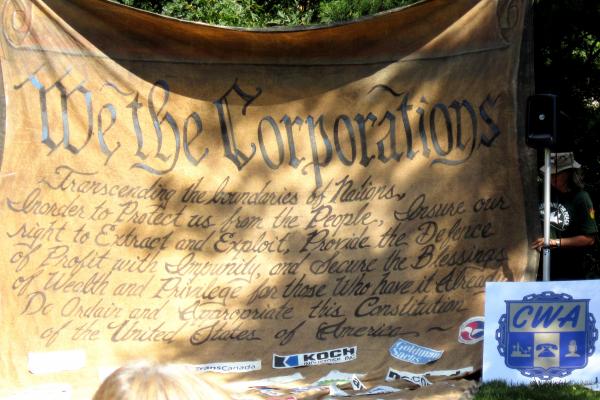When the U.S. is negotiating a mammoth, powerful international trade agreement, what do negotiators do when faced with tradeoffs between commercial interests in the U.S. and other U.S. values—such as human rights, preserving the planet we all have to live on, and helping the poor?
That’s the question I asked Carol Guthrie, Assistant U.S. Trade Representative for Public and Media Affairs, last weekend at the Leesburg, VA resort where the next big thing in trade negotiations—the Trans Pacific Partnership (TPP), basically NAFTA for the Pacific Rim—was taking shape in its 14th round of negotiations.
Many parts of civil society, from the Sierra Club to the Columban Fathers, argue the TPP would have profound negative effects on the environment, public health, human rights, internet freedom, and the global poor, among other things. A number of civil society groups showed last Sunday in Leesburg, where they could sign up for a chance to speak to negotiators—but not, unlike around 600 mostly-corporate insiders, to see the actual text being negotiated. (Members of Congress reportedly are allowed to see the text—but, unlike the insiders, not to download a copy, take notes, or bring an expert staffer with them).
Guthrie told me that U.S. negotiators “have worked very hard, and nowhere more so than in the TPP negotiations, to expand the scope of people from whom we are hearing about how U.S. trade policy should be formulated, to make sure that we are appropriately balancing commercial interests and interests in key topics such as labor and the environment.” While Guthrie was clearly thoughtful and earnest, negotiators’ attempts to "balance" such concerns in the past have amounted to inadequate tinkering around the edges of a broken model.
For example, to demonstrate negotiators’ commitment to human rights, Guthrie cited the U.S.-pushed Labor Action Plan that Colombia agreed to in order to get the 2011 U.S.-Colombia trade agreement. It was ironic that she should mention that; when I visited Colombia last year, the human rights activists I met were near-universally opposed to the U.S.-Colombia trade agreement, as it would aid and abet the export-led farming and mining operations that too often, directly or indirectly, hire paramilitaries to brutally displace, with extreme prejudice, any small farmers, labor unions, or indigenous groups in their way.
While the advocates I hear from clearly believe that the Labor Action Plan is better than the trade agreement without such a plan, the plan’s scope is limited. Yes, Colombia is in the process of hiring 100 labor inspectors this year; Guthrie detailed other ongoing U.S. government engagement in labor rights, and emailed word that the Colombian government now has 33 prosecutors focused exclusively on crimes against union members. However, as Gimena Sánchez of the nonprofit Washington Office on Latin America told me, “While the LAP is a good step forward, it requires far more effort and strict vigilance on the part of U.S. policymakers to make it a reality. Since the LAP was announced, 34 trade unionists have been murdered and another 485 death threats were received by unionists. Workers in palm, oil, mining, and ports are experiencing serious obstacles to unionization and reprisals, including firings, for attempting to get companies to live up to Colombian labor law by doing away with third party contracting.”
Speaking of people trying to get companies to live up to Colombian labor law, there’s one visiting D.C. this week: Jorge Parra, former worker in a Bogota-area Chevy plant and leader of a group of people fired and denied compensation for work-related injuries. He told Sojourners, via translation by Sánchez, that he thinks that the Labor Action Plan is not being implemented in Colombia, and that the U.S. Congress must carefully monitor the plan so that real progress is made. He cites his group (ASOTRECOL) as an example of U.S. corporations’ taking advantage of Colombia’s poor enforcement of labor laws in order to gain economic advancement.
And, of course, the Labor Action Plan only covers labor unions--it does nothign for the indigenous people threatened by paramilitaries and communities targeted by large mining corporations.
Elizabeth Palmberg is an associate editor of Sojourners magazine. She tweets @ZabPalmberg.
Got something to say about what you're reading? We value your feedback!
